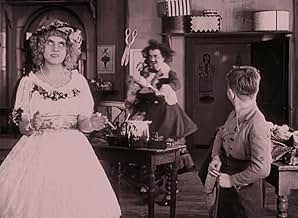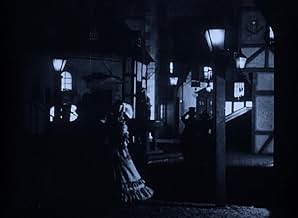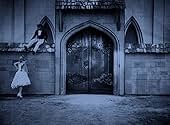VALUTAZIONE IMDb
7,4/10
2461
LA TUA VALUTAZIONE
Aggiungi una trama nella tua linguaForced into marriage by his uncle, a man decides to fool him by marrying a life-like mechanical doll instead.Forced into marriage by his uncle, a man decides to fool him by marrying a life-like mechanical doll instead.Forced into marriage by his uncle, a man decides to fool him by marrying a life-like mechanical doll instead.
Ernst Lubitsch
- Director in Prologue
- (non citato nei titoli originali)
Trama
Lo sapevi?
- QuizAt one point Lancelot takes a heart out of the leg of his pants. This is an allusion to the German expression 'Das Herz ist mir in die Hose gerutscht' (my heart slid into my pants) which is equivalent to 'to have one's heart in one's boots'.
- BlooperLancelot shouts his alarm to a monk that he is being pursued by "40 women". However, about 20 women are seen on screen.
He says this because the butler earlier had announced "Forty women at the door!" It's an estimate as it's doubtful the butler made an individual count. Also, there is no "requirement" that all referenced individuals must appear on screen.
- Citazioni
Baron von Chanterelle: [on Lancelot's wedding night] Do you need any more pieces of advice?
Lancelot: No thanks, I have an instruction manual.
- ConnessioniFeatured in Cinema Europe: The Other Hollywood (1995)
Recensione in evidenza
"Die Puppe" aka "The Doll" ranks with "The Oyster Princess" as perhaps Lubitsch's most sublime film made during his German period. Both films are superior in many respects to the well-known but pallid historical drama, "Madame duBarry" aka "Passion" (also made in 1919). Lubitsch himself felt that way. In a letter he once submitted to his biographer Herman G. Weinberg, Lubitsch considered "Die Puppe" and "Oyster Princess" as his most outstanding comedies produced in Germany before he departed for Hollywood to make "Rosita".
An early, entrancing example of what Lubitsch would become years later, "Die Puppe" is a supremely funny and delightful silent burlesque, filled with the master's light, witty, and graceful touch. The setting is frothy and artificial and it anticipates Lubitsch's enchanting fairy tale musicals of the sound era.
"Die Puppe" is introduced by Lubitsch himself with an artificial cardboard. It is a fairy tale about of a young prince named Lancelot(Hermann Thimig) who flees from his uncle Baron von Chanterelle(Max Kronert) to avoid a marriage. He settles in a monastery. There, he meets several monks who persuade him to marry a human-like mechanical doll and give them his uncle's dowry. The doll-maker Hilarius (Victor Janson) agrees to Lancelot's interest in his newest doll, an exact replica of Hilarius' daughter Ossi (played by Ossi Oswalda herself). But there is a problem: The doll-maker's young apprentice (Gerhard Ritterband) accidentally breaks the arm of the doll and now it is up to Hilarius' daughter Ossi to impersonate the doll in order to cover it up. Lancelot takes the doll/Ossi to his uncle's castle, where some of Lubitsch's most inventive gags occur as Lancelot mistakes real Ossi for the doll. He actually falls in love with the doll/Ossi. And the wedding scenes alone are some of the funniest moments ever filmed.
If you are a fan of Lubitsch, "Die Puppe" is an essential viewing.
An early, entrancing example of what Lubitsch would become years later, "Die Puppe" is a supremely funny and delightful silent burlesque, filled with the master's light, witty, and graceful touch. The setting is frothy and artificial and it anticipates Lubitsch's enchanting fairy tale musicals of the sound era.
"Die Puppe" is introduced by Lubitsch himself with an artificial cardboard. It is a fairy tale about of a young prince named Lancelot(Hermann Thimig) who flees from his uncle Baron von Chanterelle(Max Kronert) to avoid a marriage. He settles in a monastery. There, he meets several monks who persuade him to marry a human-like mechanical doll and give them his uncle's dowry. The doll-maker Hilarius (Victor Janson) agrees to Lancelot's interest in his newest doll, an exact replica of Hilarius' daughter Ossi (played by Ossi Oswalda herself). But there is a problem: The doll-maker's young apprentice (Gerhard Ritterband) accidentally breaks the arm of the doll and now it is up to Hilarius' daughter Ossi to impersonate the doll in order to cover it up. Lancelot takes the doll/Ossi to his uncle's castle, where some of Lubitsch's most inventive gags occur as Lancelot mistakes real Ossi for the doll. He actually falls in love with the doll/Ossi. And the wedding scenes alone are some of the funniest moments ever filmed.
If you are a fan of Lubitsch, "Die Puppe" is an essential viewing.
I più visti
Accedi per valutare e creare un elenco di titoli salvati per ottenere consigli personalizzati
- How long is The Doll?Powered by Alexa
Dettagli
- Tempo di esecuzione1 ora 6 minuti
- Mix di suoni
- Proporzioni
- 1.33 : 1
Contribuisci a questa pagina
Suggerisci una modifica o aggiungi i contenuti mancanti

Divario superiore
By what name was La bambola di carne (1919) officially released in India in English?
Rispondi

























